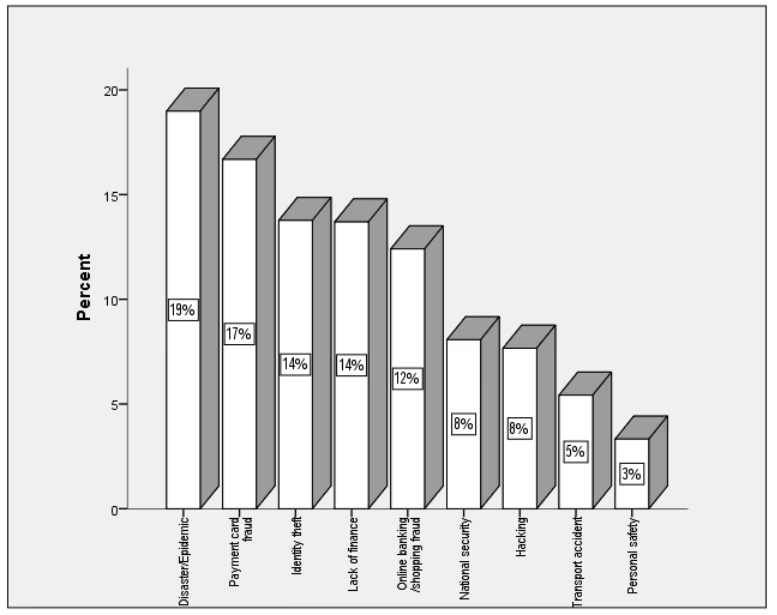Introduction
The Sherrif Security Indicator (TSSI) is an annual online survey that is organized to commemorate the Cyber Security Awareness Month. TSSI researches into the most critical security concerns of residents of Ghana. This is the sixth edition of the survey.
TSSI asks respondents to indicate their greatest and least security concerns from the following nine security threats: disaster/epidemic, hacking, identity theft, inability to meet financial obligations, payment card fraud, personal safety, security of online banking/shopping, transport accident and national security. Transport accident is a new security concern introduced in this year’s survey. Also, mobile money fraud is excluded from this year’s survey.
Respondents in this year’s survey ranked inability to meet their financial obligations, and their personal safety as their greatest security concerns, whilst they ranked disaster/epidemic as their least security concern.
Acknowledgement
This year’s survey was supported by some dedicated individuals. We are very grateful to the following individuals: Jude Aryertey Atter, Ebenezer Okroh Junior Akutteh, Richard Arthur, Elvis Anane, Abdul Karim Issah, Emmanuella Kwebu Dadzie, Michael Tornyie, Jemimah Odame Mensah, Yvette Klu, and Owusu Sekyere Kwadwo Marfo.
Methodology
This year’s survey was conducted using online questionnaires and interviews. The questionnaires were shared via social media, whilst a few respondents were physically interviewed; and the questionnaire completed on their behalf.
The survey was conducted between August and September 2025. Out of the 4500 persons targeted for this study, 1475 responses were received. This translates into approximately 19% increase in responses from last year.
The respondents (persons resident in Ghana) were asked the following questions:
- What is your gender?
- What is your age range?
- What is your highest level of education?
- Which of the 9 security factors is of greatest concern to you?
- Which of the 9 security factors is of least concern to you?
Results
This section discusses the respondents’ responses to the 5 aforementioned questions. Each subsection addresses each of the responses.
Gender
Majority of the 1475 respondents were males. Males constituted 60% whilst females constituted 40% of the respondents.
Age
Majority of the respondents were between age 26-35. Figure 1 provides the detailed age distribution.
Figure 1: Age range of respondents
Educational level
Majority of the respondents (85%) had tertiary education. The respondents had at least form 4/ JSS/JHS education. Figure 2 provides the detailed educational qualifications of the respondents.

Figure 2: Educational levels of respondents
Greatest security concern
Majority of the respondents ranked their inability to meet their financial obligations, and their personal safety as their greatest security concerns, among the 9 security threats. This was followed by transport accident. Figure 3 provides the detailed responses.
Figure 3: Greatest security concern to respondents
In segregating the responses per demography, majority of the males ranked inability to meet their financial obligations as their greatest security concern, followed by their personal safety. In the converse, majority of the females ranked personal safety as their greatest security concern, followed by inability to meet their financial obligations.
Majority of the respondents between ages 18-25, and 46-55 ranked their personal safety as their greatest security concern, whilst majority of the respondents between age 26-45 ranked their inability to meet their financial obligations as their greatest security concern. Majority of those above 55 years ranked national security as their greatest security concern.
Majority of the respondents who completed first and second cycle education, ranked personal safety as their greatest security concern, whilst majority of those with tertiary education ranked their inability to meet their financial obligations as their greatest security concern.
Least security concern
Majority of the respondents ranked disaster/epidemic as their least security concern, followed by payment card fraud. Figure 4 provides the detailed responses.

Figure 4: Least security concern to respondents
In segregating the responses per demography, majority of the females ranked lack of finance, and security of online banking/shopping as their least security concerns, whilst their male counterparts ranked disaster/epidemic as their least security concern.
Majority of the respondents between age 18-45, ranked disaster/epidemic as their least security concern, whilst majority of those between age 46-55 ranked their inability to meet their financial obligations as their least security concern. Majority of those above 55 years ranked identity theft as their least security concern.
Majority of the respondents who completed first and second cycle education ranked disaster/epidemic as their least security concern, whilst majority of those with tertiary education ranked payment card fraud as their least security concern.
Analysis
The findings indicate that, out of the 9 security threats, the respondents’ inability to meet their financial obligations, and their personal safety were their greatest security concerns. This finding is a repetition of last year’s finding. The percentage scores for these 2 factors clearly demonstrate how important financial obligations and personal safety is of utmost concern to the respondents. Transport accident being the next greatest security concern, demonstrates the need for safe road, rail and air transport. It is evident that gender, age and educational levels of the respondents had some level of influence on their greatest security concerns.
With payment card fraud and identity theft trailing disaster/epidemic as the least security concern, it can be confidently deduced that information security related concerns are the least of worries to some residents of Ghana. It is also evident that gender, age and educational levels of the respondents had some level of influence on their least security concerns.
Conclusion
The findings clearly demonstrate the importance of financial and personal security, over information security to Ghanaian residents.
The findings within 6 years of the survey, have consistently confirmed inability to meet financial obligations and personal safety as the greatest security concerns of Ghanaian residents.
We are very grateful to our respondents and all those who have supported this survey in diverse ways. We count on your continuous support, and may the almighty Allah bless you abundantly.
Author
Alhaji Sherrif Issah
Information Security Consultant | Director of Information Security and Data Protection, IIPGH.
For comments, contact author mysherrif@gmail.com | +233243835912.





